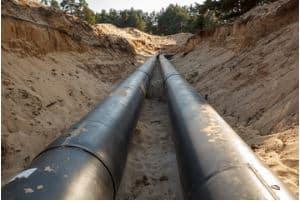Court Remands FERC’s Environmental Review of Tennessee Gas Project

The U.S. Court of Appeals for the District of Columbia Circuit on March 11 ruled that the Federal Energy Regulatory Commission inadequately examined downstream emissions when it authorized Tennessee Gas Pipeline Co.’s natural gas pipeline expansion project in Massachusetts. The court found that the commission’s environmental assessment failed to account for the reasonably foreseeable indirect effects of the project, particularly, emissions attributable to burning the gas to be carried in the pipeline. The court remanded the decision for preparation of a conforming environmental assessment. Of note, the court did not vacate the commission’s approval or the order denying rehearing by petitioners – Food & Water Watch and Berkshire Environmental Action Team.
The commission approved the project in 2019 based on its environmental assessment, which found that the proposed project would have no significant environmental impact. Tennessee Gas proposed to add 2.1 miles of pipeline and a new compressor station to its existing facilities in Massachusetts, in order to increase the system’s transportation capacity by 72,400 dekatherms per day and help the company meet the demand of downstream local distributors. Commissioner Richard Glick filed a partial dissent, taking issue with FERC’s treatment of the environmental impacts, particularly the project’s climate change implications.
The court decision noted that FERC had evidence of the incremental capacity that the project would add to Tennessee Gas’s system, with about half of the capacity – -40,400 dekatherms per day of — under contract with Columbia Gas. For the portion of the capacity under contract, “the Commission knew, with a good deal of specificity, where the gas in question would be going,” and how it would be used, the court noted. The ruling directs FERC to perform a supplemental environmental assessment, which quantifies or considers the project’s downstream carbon emissions or to provide a detailed explanation if it is not possible.
In February, FERC issued an update to the 1999 policy for the certification of new interstate natural gas projects, incorporating landowner protections and environmental justice considerations in the decision-making process. An accompanying interim greenhouse gas policy statement detailed how the commission will assess the impacts of natural gas infrastructure projects on climate change in its reviews. FERC initiated a review of the certification process in 2018 amid an unprecedented flurry of pipeline approvals that drew opposition from landowners and environmental groups. Federal agencies have recently been found to have failed to adequately review projects like the Mountain Valley Pipeline and Dakota Access oil pipeline.
EnerKnol Pulses like this one are powered by the EnerKnol Platform—the first comprehensive database for real-time energy policy tracking. Sign up for a free trial below for access to key regulatory data and deep industry insights across the energy spectrum.
ACCESS FREE TRIAL